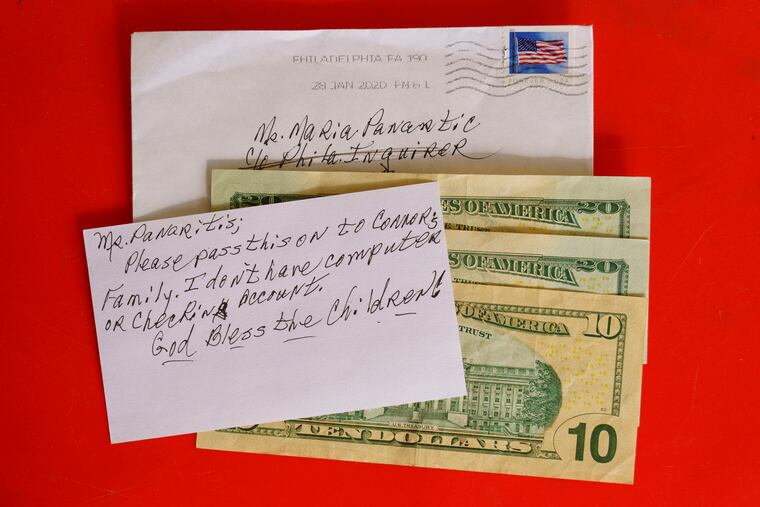An anonymous note, a little cash, and a moment of moral clarity in the U.S. mail | Maria Panaritis
Here's what happened when I visited my office recently after a long pandemic absence.

Only you know who you are. The person who sent me that letter. The one so touching that it made even the chatty front desk security guard at my Conshohocken office go quiet when I showed it to her.
I hope you are reading this, and that we might one day meet.
It was around Election Day. I had stopped by my desk at The Inquirer printing plant to lay eyes on the dust-covered contents of the abandoned pod. I have to move that stuff out before the real estate changes hands soon. Just as I was about to leave, a pile of unopened mail caught my eye. I grabbed the envelope on top.
Next to an American flag stamp was a date marked by the post office: 28 JAN 2020. In needle-point black ink below was an address in cursive scrawl that misspelled my admittedly complicated last name. The mailing address also wasn’t quite right, but it was right enough to land on my desk.
I hastily ripped open the seal. Inside was a 3x5-inch index card, two $20 bills, one $10 bill, and a few more words written in the same script.
“Ms. Panaritis,” the index card said, this time with the name spelled correctly. “I don’t have computer or checking account.”
No signature. No return address. Not even a first name. This person asked only that I give the cash to a child named Connor, an elementary schooler I had written about right before the pandemic. A boy whose brain is effectively erasing itself due to a rare condition that also is terminal.
“Please pass this on to Connor’s Family,” the note said. Then, underlining each word in the final sentence:
“God Bless the Children!”
I stared at the cash. I re-read those few sentences. In the dead quiet of my empty office, the world was suddenly still.
The bills were crisp.
The writing shaky, but the message unconditionally kind.
In my hands was empathy. Selflessness in a year utterly bereft of it, when even people we love have given in to anger, resentment and a self-centered view of who’s worthy and who’s not.
This envelope came from somewhere in Philadelphia. It sat on my desk for months, lost in the limbo of work-from-home quarantine imposed on us when the coronavirus pandemic struck with full force in March.
In writing about this 50 bucks, I’m straying from a well-worn journalistic path. The news business usually reserves its ink for super-rich donors and megagifts. The kind that often come with strings such as naming rights, and almost always a boastful bow from a benefactor.
Our politics have adopted the Darwinian spirit of such “charity.” For much of this year, leaders of the Republican-controlled U.S. Senate have had one another by the throats, while failing to deliver a stimulus package that, like this letter writer, would immediately give a damn about Americans in harm’s way.
» READ MORE: ‘He never gets sad’: Connor has ‘Childhood Alzheimer’s,’ and his little buddies are his rock | Maria Panaritis
Under the leadership of Mitch McConnell, the message instead has been: No “handouts” for you. That very word has become acerbic code for I Got Mine, You’re Not Getting Any Of It.
Even President Trump, though resoundingly defeated last month, has luxuriated in a wellspring of post-Election Day cash while doing nothing to help pandemic-battered Americans as the deadly new coronavirus wave has swelled like a tsunami: He and the Republican National Committee have raised $207.5 million since he lost re-election.
It’s grotesque.
The contours of that cartoonish evil are sharpened when you see a hand-written index card with 50 bucks next to it.
This reader — whoever you are — was humane enough to part with some money for love. This is what an advanced democratic society aims for in its government. Sadly, a large group of Americans have bought into the idea that this is not necessary. It’s a morally bankrupt posture.
Any time our government has disbursed aid, whether for tornado victims or pandemic-battered public schools, it has been not because those victims of calamity are lazy. These are lifelines.
We all were once vulnerable children, some more vulnerable than others. As adults, we sometimes become vulnerable again because life is capricious and can be cruel. Without a safety net, there is nothing but a shredded value of humanity in our Republic.
God Bless the Children!
The shaky cursive handwriting on that index card is humanity at its core. To whomever sent it, I say thank you. I will give your $50 to Connor’s family. And I will do so knowing that in so deadly, cynical, and divided a year, your value is worth billions more.